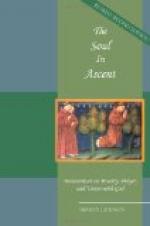The mystery of the soul’s re-awakening has never been fathomed. Sometimes there has been flashed upon conscience, apparently without a cause, a deep and awful sense of guilt. Whence did it come? What caused it? Calamities many times sweep through a life as a tornado sweeps over a field of wheat, and when they have passed there is more than an appreciation of loss; there is a vision of the soul’s unworthiness and humiliation. Again death comes exceedingly near, and, in a single hour, the solemnities of eternity become vivid, and the soul sees itself in the light of God. And again, the essential glory of goodness is so vividly manifest that the soul instinctively rises out of its sin, and presses upward, as a man wakens from a hideous nightmare. The more such phenomena are studied, the more distinct and significant do they appear and the more impossible becomes the effort to explain them. They may be verified, but they can never be explained. They are the results of the action of the Spirit of God on the spirit of man. Is this answer rejected as fanciful or superstitious? Then some of the most brilliant and significant events in the history of humanity are inexplicable.
What caused the revolution in the character of Augustine by which the sensualist became a saint? Was it the study of Plato? or the prayers of Monica? or the preaching of Ambrose? We know not; rather let us say it was the Spirit of God. Who can define the process by which Wilberforce was changed from the pet of fashionable society to one of the heroes in the world’s great crusade against injustice and oppression? Such inquiries are more easily started than settled. I repeat, the only rational and convincing word that was ever spoken on this subject is that of Jesus. The Spirit of God, whose ministry is as still as the sunlight, as mysterious as the wind, and as potent as gravitation, was the One to whom He pointed.
How has this epoch in the ascent of the soul been treated in literature? I refer with frequency to the literary treatment of spiritual subjects because poets, dramatists, and writers of fiction, more than any other class of authors, have studied the soul in its depths, in its inspirations, and in the process by which it rises and presses toward its goal.
The illustrations of this subject in the Scriptures are almost idyllic in their simplicity and beauty. There is more than flippancy in the remark that Adam’s fall was a fall upward. The statement is literally true. The fall was no fiction, but a condition of enlightenment and growth. The exit from Eden was the beginning of the long, hard climb toward the City of God.
The very moment when Isaiah saw Uzziah, the king, stricken with leprosy, he saw the Lord.
The classical delineation of a soul attaining the higher knowledge is that of the prodigal son, who, when he came to himself, saw clearly that his father was waiting to welcome him.




